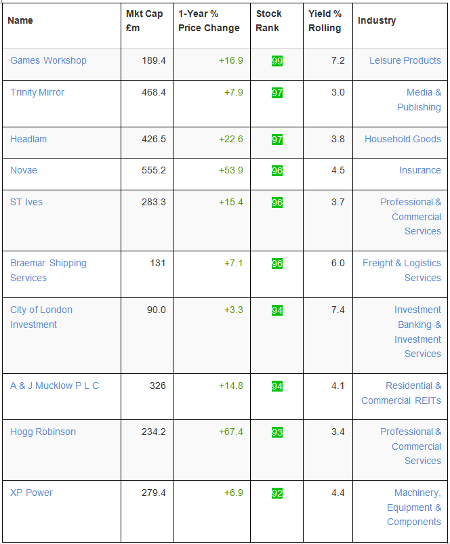A high yield small-cap strategy for 2016
23rd December 2015 13:38
by Ben Hobson from Stockopedia
Share on
2015 has been a year of mixed fortunes for UK investors. After a strong start by the main market indices, the blue chip is on course to finish several percent lower than where it started. But for smaller companies, there has been much more to cheer.
Despite a market-wide dip in the summer, the FTSE SmallCap, excluding investment trusts, is currently ahead by more than 8%. Dig deeper into that figure and you'll find some strong individual performances - but what were the hallmarks of these winning shares?
Some of the best gains were seen in good quality, attractively valued firms with above average dividend yields. These qualities helped to bolster their price momentum and achieve a positive total return through the year.
These factors echo the investing priorities of some of the UK's most respected and highly successful investors and fund managers. One of the best known among individual investors is Lord Lee of Trafford, the Lib Dem peer. He's well known for being one of Britain's first "ISA millionaires" - an achievement that hinged on his disciplined approach to to investing in smaller companies. He compounded his returns over many years by taking positions in attractively valued, good quality, high yielding shares.
A similar approach is employed by the well-known small-cap fund manager, Gervais Williams. His strategy at Miton Group is predominantly focused on buying 'value' stocks with good financial and management quality that also pay dividends. In his book The Future is Small, Williams notes that dividend yield can be a valid method of identifying the way in which the stockmarket might be intrinsically undervaluing stocks. Equally, he says the scope for investment income to grow through compounding dividends is very powerful.
Indeed, the impact of dividends on long-term total portfolio returns' is well known. One of the most comprehensive studies was published in a 2002 book called Triumph of the Optimists by UK academics Elroy Dimson, Paul Marsh and Mike Staunton. They showed that while year-to-year investment performance is driven by capital gains, the lion's share of long-term performance actually comes from reinvested dividends. Their research showed that over 100 years, an investment in the market portfolio with dividends reinvested would have produced 85 times the wealth generated by the same portfolio that only relied on capital gains.
With these concepts in mind, Stockopedia screened the market for Interactive Investor to get an idea about the sorts of companies that pass these tests. We targeted the FTSE SmallCap index and looked for firms with strong financial and business quality at attractive valuations and with positive price momentum. They also had to be offering yields of more than 3.0%. The list is sorted according to StockRank, which scores and ranks every company in the market based on the strength of its combined quality, value and momentum.
(Click to enlarge)

As the table shows, these high ranking, high yielding shares have all seen positive price growth over the past 12 months. The strongest gains were seen at corporate services business , which was up 67%, and insurance business , up 54%. The strongest rolling yields here are at , on 7.2%, and , on 7.1%. Games Workshop also has the highest overall ranking score for its combination of quality, value and momentum.
Elsewhere on the list is media group , floorcovering business , marketing and publishing firm . They are followed by shipbroker , real estate investment trust and power supply company, .
Small-cap outperformance
It has been a decent year for the FTSE SmallCap index, with a number of its better quality, high yielding shares generating some useful returns. But it's worth remembering that smaller companies do come with greater investment risk than the market's blue-chip stocks. Small-caps can be marked down heavily when investors lose confidence. They also have less financial muscle to ride out operational setbacks or changes in their market environment. For that reason, detailed research and diversification is important. Looking for the good quality, attractively valued shares on strong yields should offer a useful place to start.
This article is for information and discussion purposes only and does not form a recommendation to invest or otherwise. The value of an investment may fall. The investments referred to in this article may not be suitable for all investors, and if in doubt, an investor should seek advice from a qualified investment adviser.
About Stockopedia
Interactive Investor's Stock Screening series is written by Ben Hobson ofStockopedia.com, the rules-based stock market investing website. You canclick here to read Richard Beddard's review of Stockopedia.com and learn more about the site.
● To learn more about value investing strategies, you can download the FREE Stockopedia book, How to Make Money in Value Stocks
It's worth remembering that these and other investment articles on Interactive Investor are simply for generating ideas and if you are thinking of investing they should only ever be a starting point for your own in-depth research before making a decision.
About the author

*No fee for publication is involved between Interactive Investor and Stockopedia for this column.